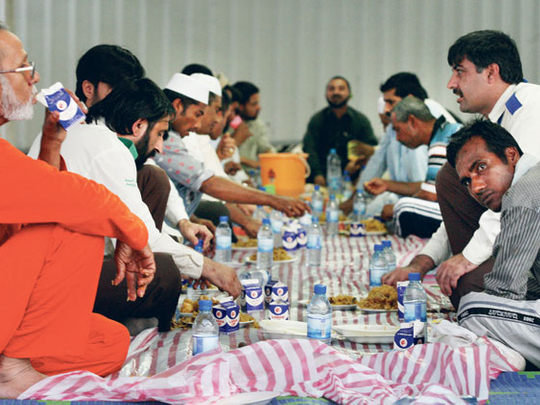
Abu Dhabi: Four small meals a day consisting of proper fibres and fluids is the best way to conserve your energy while fasting this Ramadan, advised a clinical dietician.
It is best to divide your iftar into two portions, having a small meal consisting of dates, water and low-fat milk at first, then a ten-minute break which is followed by more healthy food, said Fatima Al Kaff, clinical dietician at the Shaikh Khalifa Medical City.
"This way, your body can maintain its blood sugar levels and you can continue feeling energised throughout the day," Al Kaff told Gulf News after a lecture on healthy eating habits in Ramadan recently.
People tend to eat out a lot during the holy month, with all the attractive buffets on offer, and they overeat without understanding the need to take care of their internal organs, Al Kaff said during the lecture.
She added that people need to get 30 minutes of physical activity to maintain their weight, or 60-90 minutes for weight loss.
Al Kaff also advised that people limit their intake of caffeine, spicy foods and icy cold water.
"These foods shock your stomach. Your stomach is a part of your body and like the rest of it, you need to take care of it," she said.
Al Kaff added that people should try to consume enough fibre, and more than 2.5 litres of water a day to ensure that they did not face constipation.Dr B. Gunasekaran, internal medicine specialist at Lifeline Hospital, said that having smaller meals frequently was indeed the best way to conserve energy during the month of fasting. "We also see a lot of cases of constipation, because people neglect to have enough fibre and water," Dr Gunasekaran said. He added that in the summer, people should drink three litres of water to stay hydrated.Most attendees at the lecture said they had not been following proper dietary habits during the month. A 59-year-old attendee who declined to be named said she did have small meals but she did not have enough of them.
"I do have a lot of fibre in my diet and as we were advised in the lecture, my family and I avoid oily foods. But I don't have food frequently and I feel tired during the day." The woman added that she had tried eating 4 small meals previously, and it had helped her energy levels.
Proper steps: Healthy habits
- Eat four small, healthy meals a day.
- Divide iftar into two meals separated by a ten-minute break, with the first half consisting of dates, water and low-fat milk or laban.
- Try to eat suhoor late at night to reduce chances of blood sugar decrease during the fast.
- Limit all food portions to the size of your fist.
- Drink 2.5-3 litres of water. Eat fresh fruits and vegetables at each meal.
Foods to limit
- Food cooked or fried with oil, butter or ghee.
- Sweets, and sugary desserts, foods and drinks.
- Excessively salty and spicy foods.
- Caffeine, whether in beverage or chocolate.
- Icy cold water.
Source: Shaikh Khalifa Medical City
Foods to limit
- Food cooked or fried with oil, butter or ghee.
- Sweets, and sugary desserts, foods and drinks.
- Excessively salty and spicy foods.
- Caffeine, whether in beverage or chocolate.
- Icy cold water.
Source: Shaikh Khalifa Medical City












